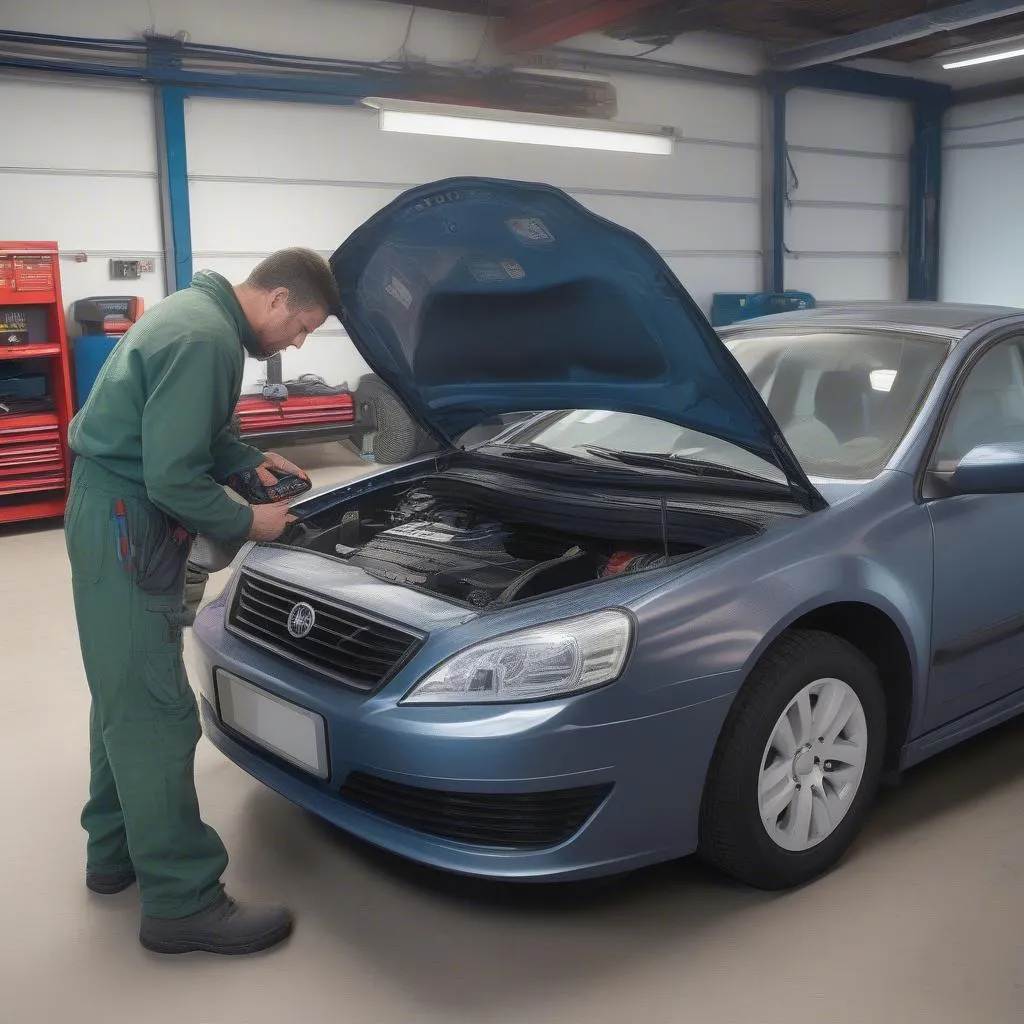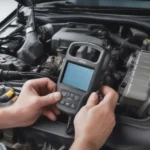Imagine this: you’re cruising down the highway, enjoying the open road, when suddenly, your car starts making a strange grinding noise. You pull over, check your brakes, and realize something’s wrong. The dreaded ABS light is flashing on your dashboard!
You’ve heard about the Bosch 1350 scan tool, a powerful diagnostic tool used by professional mechanics. But how exactly can you use it to diagnose your ABS system?
What is ABS and why is it important?
The Anti-lock Braking System (ABS) is a safety feature in your car that prevents your wheels from locking up during hard braking. It works by rapidly applying and releasing the brakes, allowing you to maintain steering control even on slippery surfaces.
Diagnosing ABS problems can be crucial for your safety. A faulty ABS system can significantly increase your stopping distance, putting you at risk of accidents.
Diagnosing ABS with the Bosch 1350 Scan Tool
The Bosch 1350 scan tool is a powerful diagnostic tool that can be used to identify and resolve a wide range of issues, including ABS problems. It provides comprehensive information about your vehicle’s electronic systems, including the ABS system.
Here’s a step-by-step guide on using the Bosch 1350 scan tool to diagnose ABS problems:
1. Connect the scan tool to your vehicle’s OBD-II port.
The OBD-II port is typically located under the dashboard, near the steering column.
2. Turn the ignition key to the “ON” position, but do not start the engine.
3. Select “ABS” from the scan tool’s menu.
4. Review the ABS system codes.
The scan tool will display a list of diagnostic trouble codes (DTCs) related to the ABS system. Each code corresponds to a specific problem.
5. Interpret the DTCs.
You can use a code reader, an online service, or a repair manual to find the meaning of the DTCs and identify the possible causes of the problem.
6. Use the scan tool’s advanced functions.
The Bosch 1350 scan tool offers advanced features like data streaming, actuator testing, and sensor calibration. These functions can help you identify the root cause of the problem and perform necessary repairs.
Common ABS Problems and Their Solutions
1. ABS Sensor Malfunction
An ABS sensor monitors the speed of your wheels and transmits this information to the ABS module. If the sensor is faulty, the ABS system may not be able to function correctly.
Solution: Replace the faulty sensor with a new one.
2. ABS Module Failure
The ABS module receives data from the sensors and controls the braking system. If the module fails, the entire ABS system may stop working.
Solution: Depending on the severity of the problem, you might need to repair or replace the ABS module.
3. Hydraulic System Problems
The hydraulic system is responsible for applying pressure to the brakes. Problems with the hydraulic system can affect the ABS system.
Solution: Diagnose and address the hydraulic system issue, which may involve replacing worn or damaged components.
4. Low Brake Fluid
Low brake fluid can compromise the ABS system’s performance.
Solution: Top up the brake fluid to the correct level.
5. Electrical Problems
Wiring problems, loose connections, or damaged wiring can affect the ABS system’s functionality.
Solution: Inspect the ABS system wiring for any damage or loose connections, repair or replace as needed.
Additional Tips for Diagnosing ABS Problems
- Check for blown fuses: A blown fuse in the ABS system can also cause the ABS light to illuminate.
- Look for visible damage: Inspect the ABS system components for any visible damage, like leaks or broken parts.
- Get a professional diagnosis: If you are unsure about the cause of the problem, it’s always best to consult a professional mechanic for a diagnosis.
FAQs about Diagnosing ABS with Bosch 1350 Scan Tool
1. What does the “ABS light” mean?
The “ABS light” indicates a problem with the ABS system. It could be a minor issue that can be easily resolved, or it could be something more serious that requires professional attention.
2. Can I drive my car with the ABS light on?
It’s not recommended to drive your car with the ABS light on. While your brakes will still function, the ABS system will not be able to provide its safety features.
3. Can I diagnose ABS problems myself?
While the Bosch 1350 scan tool can help you identify ABS problems, diagnosing and repairing ABS systems can be complex. It’s always best to consult a professional mechanic for a thorough diagnosis and repair.
Other Useful Articles:
 Bosch 1350 Scan Tool for ABS Diagnosis
Bosch 1350 Scan Tool for ABS Diagnosis
Need Help Diagnosing Your ABS System?
Get in touch with us today! We have expert technicians who can help you diagnose and fix your ABS system, and we are available 24/7 to answer your questions. Contact us via WhatsApp: +84767531508.
Let us know your experience with the Bosch 1350 scan tool and ABS diagnosis in the comments below!


